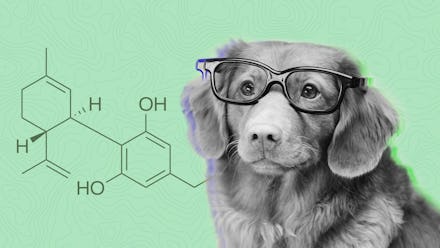Before you dose your anxious dog with CBD, here's what you should know

Hemp-derived CBD seems to be everywhere these days, from fast food burgers to Martha Stewart's anticipated line of holistic pet products. An abbreviation for cannabidiol, the hemp-derived substance does not get users high as it doesn't contain THC, but rather boasts a slew of other comforting effects that many believe can help with issues ranging from anxiety to joint pain (although there's some debate over just how legit CBD's effects really are). You can decide for yourself if your CBD-infused seltzer or lemon-flavored oil is working, but before dosing your cat or dog with the same to fix their problems, make sure you know do the requisite research on if CBD is actually good for pets.
Although the FDA "hasn't evaluated CBD pet products for safety or effectiveness, nor is there any definitive research on CBD and pet safety," says Gabby Slome, co-founder of the pet food company Ollie, "There really isn’t a difference between pet CBD and human CBD. If anything, the two main differences are that pet CBD oil will generally contain added special flavoring like bacon extract or cod liver extract, to make it more appealing to dogs, and that the FDA generally requires different labeling for human drugs, food, and dietary supplements than for products intended for animals."
But why give your pet CBD in the first place? "Many of the benefits of pet CBD are similar to ones for humans," explains Slome. "Anecdotally, it can help alleviate pain, stress, anxiety, nausea, stress, inflammation, and even seizures." If your pet gets stressed out about flying or loud fireworks, for instance, a CBD product might help calm them down.
However, keep in mind that pets obviously can't give you feedback if they're feeling the effects of CBD, and their body language may not reflect whether the product is actually working, says Slome. To determine how much CBD your pet needs for a positive effect, look at their size and health. "Minor issues might be treated with .25 milligrams for every pound [your pet weighs], and more serious ailments might be treated with .5 milligrams for every pound," Slome advises.
Still, since there are no clear medical guidelines on safe, effective dosages of CBD for animals just yet, she adds that you might want to give your pet the lowest dose possible when beginning their treatment — and then, keep watch. "The best way a pet parent can tell if CBD treatment is effective is by closely monitoring their dog," Slome says.
The dosage should take effect within hours, if not sooner. If you gave your pet CBD for a particular reason (say, extreme separation anxiety), observe to see if you notice a positive change in their behavior. It's important to watch for negative side effects, too, that might indicate your pet has had too much CBD. "Excessive sedation, disorientation, over-excitement, and vomiting are clear signs that your dog is not reacting well to CBD," Slome says.
And of course, consult with the vet if you're concerned. "As with any medication, pet parents should speak with their veterinarian before treating their dog with CBD," Slome says. You surely won't be the only dog or cat owner to be asking those questions, as CBD continues to grow in popularity. "A lot of it will depend on research and regulation, but I’d place bets that we’ll see more CBD-infused pet care and pet food products," says Slome. And hopefully more calmer, happier pets as a result.